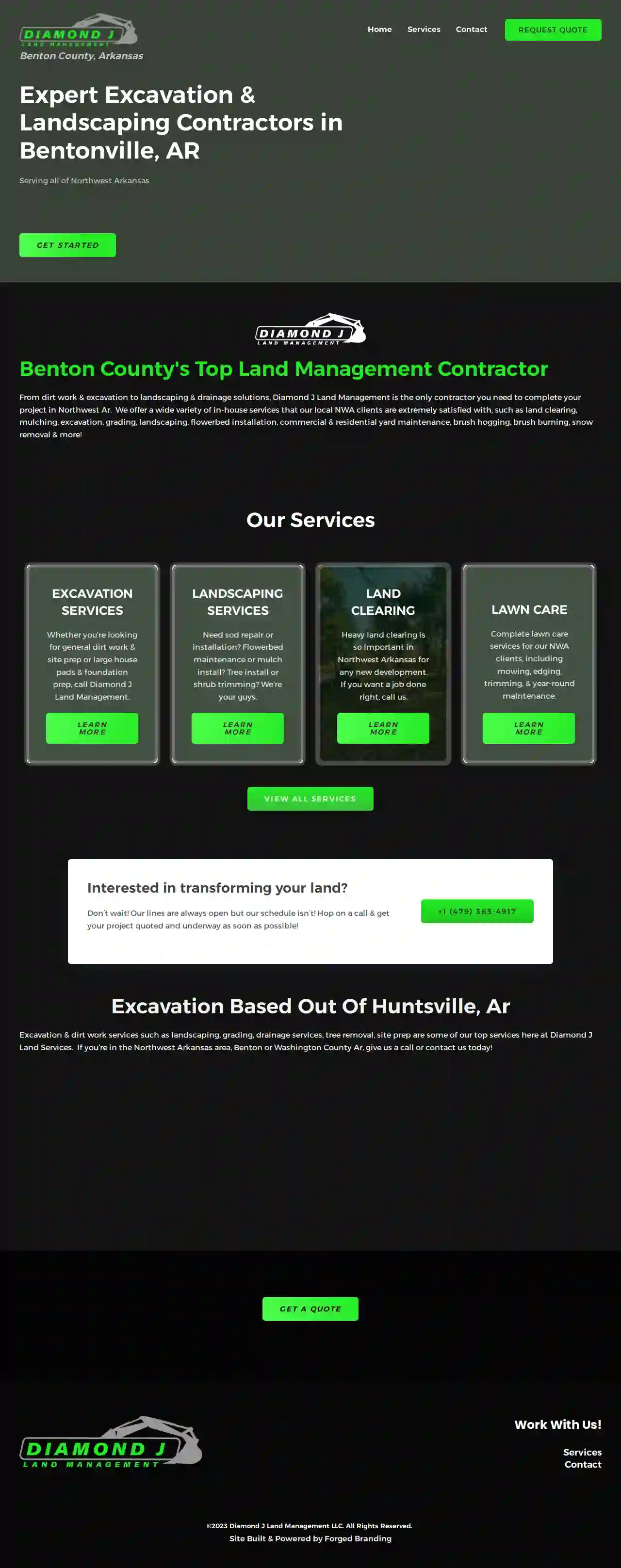Excavation Contractors Fort Smith
Top Excavation Company Near Me in Fort Smith
Receive 3 FREE Excavating Contractors quotes for your project today! Compare profiles, reviews, accreditations, portfolio, etc... and choose the best service.

GNG Underground
57 reviewsRogers, USWelcome to GNG Underground Professional Excavation, Utility Trenching, and Landscaping Services for Northwest Arkansas Safety & Quality Service, Always our Priority Serving all of Northwest Arkansas Welcome to GNG Underground, providing experienced excavation and landscaping services for NWA GNG is a Veteran-Owned excavation company, based in Bella Vista and serving all of Northwest Arkansas GNG Underground is a multi-faceted excavating and landscaping company in Northwest Arkansas. From clearing land for your new project to installing storm shelters and septic tanks and propane tanks, GNG has you covered. We are your go-to outdoor utility company. We take pride in the quality of our work and the projects we complete for our clients. We offer a wide variety of outdoor excavation services in Northwest Arkansas so that when you need something done on your property, you know that you can call the trusted excavators at GNG Underground.
- Services
- Why Us?
- Gallery
Get Quote
Lukas Excavation and Demolishing
53 reviewsHot Springs, USAbout Us Licensed And Insured We are a State Licensed Excavation Contractor in Arkansas and Professionally Insured which puts us into the seat of responsibility and requires professionalism for every job we do. Prompt and Reliable We follow Arkansas State Laws and Industry Guidelines as a Licensed Excavation Contractor to complete your job promptly and reliably. We check with all Arkansas underground utility service providers before we dig to assure safety to ourselves and our customers. Satisfaction Guaranteed We strive to do every job as if we were the customer so there is complete satisfaction when the job is done. We provide excavation services in Montgomery County, Yell County, Hot Springs County, Pulaski County, Polk County, Saline County, Garland County, Pike County, Arkansas, Hot Springs, Hot Springs Village, Little Rock, North Little Rock, Malvern, Sims, Story, Mt. Ida, Mena, Russellville, Benton, Bryant, Bismarck, Maulmelle, Sherwood, Booneville, Danville, Searcy, Conway, Pine Bluff, Sheridan and many other cities within Arkansas.
- Services
- Why Us?
- Gallery
Get Quote
Les Rogers Excavating & Materials
3.834 reviews1000 Wellington Rd, Stratford, N0B 2L0, USAbout Les Rogers Inc. Les Rogers Inc. is a family-owned and operated business with over 30 years of experience in the construction industry. We are committed to providing our clients with high-quality workmanship and exceptional customer service. Our team of skilled professionals is dedicated to delivering projects on time and within budget. We specialize in a wide range of construction services, including: Residential construction Commercial construction Renovations Additions Custom homes At Les Rogers Inc., we believe in building strong relationships with our clients. We take the time to understand your needs and goals, and we work closely with you throughout the entire construction process. We are committed to providing you with a positive and stress-free experience. Contact us today to learn more about our services and to schedule a free consultation.
- Services
- Why Us?
Get Quote
Arrow Dirt Works
511 reviewsRogers, US- Services
- Why Us?
Get Quote
Diamond J Land Management
1Rogers, US- Services
- Why Us?
Get Quote
Over 3,943+ Excavation Pros on our directory
Our excavation experts operate in Fort Smith & surroundings!
ExcavationHQ has curated and vetted Top Excavation Pros in and around Fort Smith. Find a top & reliable business today.
Frequently Asked Questions About Excavation Contractors
- Soil Type and Stability: Stable, cohesive soils allow for deeper excavations than loose or unstable soils.
- Groundwater Level: Excavations below the water table require dewatering techniques to manage water intrusion.
- Equipment and Resources: The size and capabilities of excavation equipment influence the achievable depth.
- Safety Regulations: OSHA and other safety regulations impose limitations on trench depths without proper shoring or sloping.
- Project Requirements: The purpose of the excavation (basement, pool, foundation) determines the necessary depth.
- Topsoil Removal: Stripping the fertile topsoil layer from a site, often preserving it for landscaping.
- Trench Excavation: Digging long, narrow trenches for utilities (pipes, cables) or foundations.
- Basement Excavation: Removing earth to create a space for a basement beneath a structure.
- Pool Excavation: Digging a precise hole for installing a swimming pool.
- Roadway Excavation: Removing earth and preparing the ground for road construction.
- Demolition Excavation: Clearing debris and preparing the site after demolition.
- Channel Excavation: Creating channels for drainage or irrigation.
- Spring and Fall: Often considered favorable due to moderate temperatures and drier soil conditions.
- Summer: Can be suitable, but hot weather can make working conditions challenging and might require additional measures (shade, hydration) for workers.
- Winter: Excavation in winter can be more difficult due to frozen ground, snow, and potential delays caused by inclement weather. It might also require specialized equipment or techniques.
- Trench Collapses: Unstable trench walls can cave in, posing a severe risk to workers. Proper shoring and sloping are crucial safety measures.
- Utility Damage: Striking underground utilities (gas, water, electric) can cause leaks, explosions, or electrocution. Accurate utility locates and careful digging are essential.
- Falling Objects: Materials or equipment falling into excavations can injure workers. Securing work areas and using appropriate safety gear is vital.
- Equipment Accidents: Operating heavy machinery involves risks of rollovers, collisions, or mechanical failures. Trained operators and proper equipment maintenance are critical.
- Environmental Hazards: Excavated soil might contain hazardous materials (asbestos, lead). Proper testing and disposal procedures are necessary.
How deep can you excavate?
What are the different types of excavation?
What is the best time of year for excavation?
What are the risks associated with excavation?
How deep can you excavate?
- Soil Type and Stability: Stable, cohesive soils allow for deeper excavations than loose or unstable soils.
- Groundwater Level: Excavations below the water table require dewatering techniques to manage water intrusion.
- Equipment and Resources: The size and capabilities of excavation equipment influence the achievable depth.
- Safety Regulations: OSHA and other safety regulations impose limitations on trench depths without proper shoring or sloping.
- Project Requirements: The purpose of the excavation (basement, pool, foundation) determines the necessary depth.
What are the different types of excavation?
- Topsoil Removal: Stripping the fertile topsoil layer from a site, often preserving it for landscaping.
- Trench Excavation: Digging long, narrow trenches for utilities (pipes, cables) or foundations.
- Basement Excavation: Removing earth to create a space for a basement beneath a structure.
- Pool Excavation: Digging a precise hole for installing a swimming pool.
- Roadway Excavation: Removing earth and preparing the ground for road construction.
- Demolition Excavation: Clearing debris and preparing the site after demolition.
- Channel Excavation: Creating channels for drainage or irrigation.
What is the best time of year for excavation?
- Spring and Fall: Often considered favorable due to moderate temperatures and drier soil conditions.
- Summer: Can be suitable, but hot weather can make working conditions challenging and might require additional measures (shade, hydration) for workers.
- Winter: Excavation in winter can be more difficult due to frozen ground, snow, and potential delays caused by inclement weather. It might also require specialized equipment or techniques.
What are the risks associated with excavation?
- Trench Collapses: Unstable trench walls can cave in, posing a severe risk to workers. Proper shoring and sloping are crucial safety measures.
- Utility Damage: Striking underground utilities (gas, water, electric) can cause leaks, explosions, or electrocution. Accurate utility locates and careful digging are essential.
- Falling Objects: Materials or equipment falling into excavations can injure workers. Securing work areas and using appropriate safety gear is vital.
- Equipment Accidents: Operating heavy machinery involves risks of rollovers, collisions, or mechanical failures. Trained operators and proper equipment maintenance are critical.
- Environmental Hazards: Excavated soil might contain hazardous materials (asbestos, lead). Proper testing and disposal procedures are necessary.